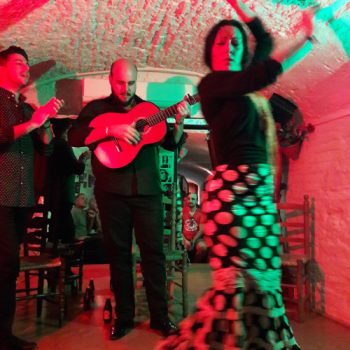
Student-Teacher Relationships in Spain (Part II)
You’ve probably seen Part I of this series where Dani focuses on what the relationship between students and teachers is like from the perspective of an English teacher. If you missed that article check it out here.
Dear Josh,
I have learned a lot about Spanish culture and about myself by studying my sociology degree at the University of Granada (read Parts I here and Part II here). For example, I have been trying to understand importance of failing and how it can be integrated into the school system—something that is difficult for a child of the No Child left Behind Act to understand. It has also opened my eyes to social activities like how to successfully integrate with locals. And, without a doubt, it has had an impact on how I view relationships in Spanish culture—especially within the school system itself (check out this introduction to the Spanish school system).
When I first started studying my degree in Granada, I was shocked at the relationship that exists between university students and professors. I have since then worked to adapt to the differences, but there are still some things that are difficult for me to assume. I don’t want to necessarily say that it is better or worse than what I was used to seeing back in the U.S., but it was definitely a big change. Here are some of the things that jumped out at me:
How students interact with their teachers:
The way that students interact with their teachers was way ‘closer’ than what I was used to back in the U.S. on so many different levels. However, the two things that stood out to me were:
1.) Being on a first name basis: Dani mentioned in her article that her students call her by her first name and this is definitely something that I see in almost all of my university classes. While this shocked me in itself, I was also surprised to find that most students don’t actually talk to their professors in a ‘formal’ way. In Spanish, they differentiate between an informal you (tu) and a formal you (usted). I would have assumed that when talking to professors, most students used the formal usted. However, I found that almost no students make the effort to talk to their teachers using formal language. This was something that I personally am not totally sure about and, therefore, tried not to call any professor by his or her name (first or last) and worked to avoid using the “tu” form by talking more hypothetically—with usted that can mean a formal you but also a generic you.
Note: Not all professors allow for students to speak to them informally, but it seems like it is an all or nothing sort of thing—either the teacher is really strict and insists on usted or you can call them by their first name.
2. ) Informal conversations/going for coffee: This was something that was slightly less common but many students had informal conversations with their professors during their tutoring sessions. In addition (while it wasn’t really common), sometimes you could see groups of students having coffee or even a beer with their teachers at the campus cafetería. Personally, my strangest experience is when one teacher who came with the entire class for a beer after our exam with him. I understand that it is a way to connect with your students, but it isn’t something that I would necessarily expect from a teacher.
How teachers react to their students:
At the same time that students act a certain way with their teachers, I also see differences in what the teachers expect from their students. This can also be seen in two different areas:
 1.) Vomiting class notes: Although I had several professors that highly valued creativity when completing class projects or exams, some of my teachers wanted to have exactly what was presented in class be what you learn for the final evaluation. This can be very draining because you are not supposed to learn the subject per se, but just memorize what has been given to you and ‘vomit’ it back up at the time of the exam. Personally, I cannot understand why you wouldn’t want your students to work on their creativity and develop ideas (even if they are different to what you believe). I know this kind of thinking also exists back home but the commonness of it makes me feel slightly uncomfortable.
1.) Vomiting class notes: Although I had several professors that highly valued creativity when completing class projects or exams, some of my teachers wanted to have exactly what was presented in class be what you learn for the final evaluation. This can be very draining because you are not supposed to learn the subject per se, but just memorize what has been given to you and ‘vomit’ it back up at the time of the exam. Personally, I cannot understand why you wouldn’t want your students to work on their creativity and develop ideas (even if they are different to what you believe). I know this kind of thinking also exists back home but the commonness of it makes me feel slightly uncomfortable.
For example: For one exam I went to my professor and asked her for additional resources to continue researching a very specific idea that would be on the exam. She told me that there was no bibliography for the class because she had specially developed the content and that if my notes weren’t good enough, I should ask a classmate for theirs.
2.) Treat you poorly if you don’t do what they want how they want: This is one of the biggest things that bothers me about the Spanish education system—when a student isn’t able to follow along with what is going on it is not uncommon for teachers to tell them that “no sirves para esto” (a rough translation meaning “you can’t do this”). It is a phrase often used in classes like mathematics or English and sometimes I think that when a teacher isn’t able to dominate their own subject in way they can teach it to others, this is their reaction.
However, I don’t know anyone who has never been told this and I don’t believe that telling someone they cannot do something is the right solution if you want them to improve (although I don’t deny it might help in specific cases). Overall, I believe that it is this attitude is dangerous for the development of the country. For example, it has contributed to a certain age group of the population to hate English—not because they are not good at it or that Spanish people are bad at languages but that they have been forced to study and been told they are useless at it. I don’t know if it happens as such in the U.S., but I never really experienced it and I wish that no student ever would in the future.
In Spain, these are just some things that I have personally noticed and, at the end of the day, education around the world is similar at the same time that there are regional or cultural differences. If you have had a distinct experience, please let us know in the comments!
Sincerely,
Spain




